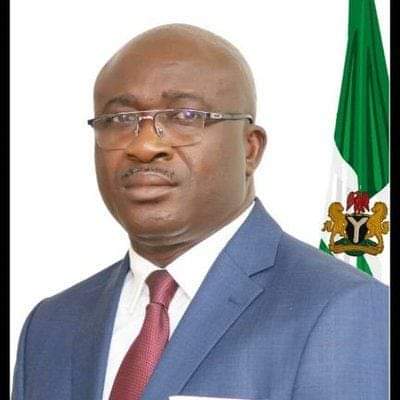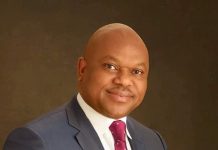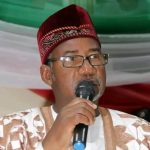By Kenneth Orusi
In the bustling hub of Delta State’s capital territory, the name Chief Patrick Ukah has become synonymous with quiet but impactful transformation.
As the Director-General of the Delta State Capital Territory Development Authority (DSCTDA), Chief Ukah has taken a measured yet dynamic approach to urbanization, infrastructure enhancement, and environmental sustainability.
His tenure reflects a commitment to creating a well-organized, functional, and aesthetically pleasing capital territory.
Chief Ukah’s leadership has been characterized by strategic planning, grassroots engagement, and meticulous implementation of policies aimed at improving the lives of residents and visitors.
His work aligns seamlessly with Governor Sheriff Oborevwori’s MORE Agenda, which prioritizes Meaningful Development, Opportunity for All, Realistic Reforms, and Enhanced Peace and Security.
The Role of DSCTDA in Delta State’s Growth
The Delta State Capital Territory Development Authority under the watch of Chief Ukah, the Akatakpo Eyi 1 of Okpanam kingdom in Oshimili North local government area of the State, is tasked with the planning, coordination, and execution of development projects within the capital territory.
It aims to transform Asaba and its environs into a modern and efficient urban center. Chief Ukah’s tenure has seen the agency evolve into a vital instrument for urban renewal and socio-economic growth.
His administration has focused on key areas such as infrastructure, environmental management, urban aesthetics, and the creation of sustainable communities.
Each initiative reflects his vision for a Delta State capital territory that is not only functional but also reflective of the state’s rich cultural heritage and aspirations for the future.
Quiet Leadership, Big Results
Chief Ukah’s leadership style is notably understated, emphasizing results over rhetoric.
While his development efforts may not always attract loud applause, the outcomes speak volumes. Here are some of the major strides he has made in quietly transforming the Delta State capital territory:
1. Urban Renewal and Infrastructure Development
Under Chief Ukah’s watch, DSCTDA has embarked on several road rehabilitation and construction projects aimed at improving connectivity and reducing traffic congestion in Asaba and its environs.
Key roads and drainage systems have been upgraded to address perennial flooding issues, particularly during the rainy season.
Projects such as desiltation of concrete drains and culverts along some major roads in Asaba, desiltation of concrete drains and culverts along some major roads in Asaba, phase II, maintenance of pot holes along Umueze Street (access road to Asagba’s Palace, Asaba, maintenance of pot holes in Asaba, Phase I.
Also, construction of hard shoulders along Anwai/Illah road from the flyover ramp to government house gate in Asaba, flood control measure at DBS sewer entry point-Brigade Commander’s residence, Asaba, construction of Gerald Onianwa Crescent/Adigwe Juwa Avenue in Asaba, construction of Paul Ikediashi Street/Ononye Ugboma/Barr. I.M.O close/Nwabuoku Crescent/Chief J. Obi Street off Old Anwai road, Asaba.
Similarly, under the Director General, the agency has equal embarked on the construction of Ogbotobo Crescent, Asaba, construction of Ifeanyi Okeke Drive off Nkem Okwuofu Street/Re-construction of Debe Crescent junction by Nkem Okwuofu Street/construction of NBA Bar Center road in Asaba.
Rehabilitation and Asphalt overlay of Ajayi/Ofili Nwamu/Ilukwu Ofili Nwamu and construction of Odogwu Close (from stop over junction on Ibusa road to ‘A’ Police Station on Nnebisi road, Asaba, Asphalt overlay of Liberty Estate, Asaba.
In same vain, the construction of Odozi Obodo/Aninta/Aninta Street off Ezenei Avenue in Asaba, construction of Leo Okonweze Street in Asaba, construction of Amaechi Agusi Street and adjoining streets, Asaba and reconstruction of Obiora Allanah street and Living Word Lane with a spur to Chiagoziem, Asaba.
The completion of internal road networks in developing areas have significantly enhanced accessibility and mobility for residents.
These initiatives have not only eased movement but have also boosted economic activities by linking residential neighborhoods with commercial hubs.
2. Beautification and Environmental Sustainability
Chief Ukah has placed a strong emphasis on urban aesthetics and environmental preservation. Through DSCTDA, several beautification projects have been initiated, including the landscaping of major roads, installation of streetlights, and creation of green spaces.
The Asaba Riverfront Project, a hallmark of his administration, aims to transform the waterfront area into a vibrant recreational and tourism hub.
This project highlights his commitment to combining environmental sustainability with economic development, creating a space that promotes leisure, tourism, and local enterprise.
3. Waste Management and Sanitation
Recognizing the importance of a clean environment, Chief Ukah has prioritized waste management reforms.
DSCTDA has partnered with private firms and local governments to enhance waste collection and disposal systems.
Public awareness campaigns on proper waste disposal and recycling have also been launched to foster a culture of environmental responsibility among residents.
These efforts have not only improved the cleanliness of Asaba but have also positioned it as a model city for sustainable urban living in Nigeria.
4. Housing and Urban Planning
To accommodate the growing population of the capital territory, Chief Ukah has initiated housing projects that provide affordable and modern homes for residents.
His administration has also enforced urban planning regulations to prevent haphazard development and ensure that the city’s growth aligns with its master plan.
By promoting orderly development, Chief Ukah is laying the groundwork for a city that is both livable and resilient to future challenges.
5. Security and Community Engagement
Security is a cornerstone of any thriving urban area, and Chief Ukah has worked closely with law enforcement agencies to enhance the safety of the capital territory.
Through improved lighting, neighborhood watch programs, and partnerships with security agencies, DSCTDA has created an environment that fosters peace and security.
Community engagement has also been central to his approach. Regular town hall meetings and consultations ensure that residents are active participants in the development process.
This inclusive approach has helped build trust and foster a sense of ownership among the people.
Impact on Socio-Economic Development
Chief Patrick Ukah’s initiatives have had a ripple effect on the socio-economic landscape of Delta State’s capital territory. Improved infrastructure and aesthetics have attracted investors, boosted tourism, and enhanced the quality of life for residents.
Small businesses, in particular, have benefited from better connectivity and a cleaner environment, leading to increased economic activities and job creation.
Moreover, the focus on sustainability and urban planning has positioned Asaba as a model for other state capitals in Nigeria. Chief Ukah’s leadership demonstrates that development does not always have to be loud to be effective.
By focusing on the basics and ensuring their proper implementation, he has achieved remarkable results.
Challenges and the Way Forward
Despite the successes, Chief Ukah’s tenure has not been without challenges. Issues such as funding constraints, resistance to change, and the complexities of urban management in a growing city have posed significant hurdles.
However, his resilience and strategic problem-solving have enabled DSCTDA to navigate these challenges effectively.
Looking ahead, the authority under his leadership aims to deepen its efforts in urban renewal, with plans to expand housing projects, enhance public transportation, and further develop the Asaba Riverfront.
These initiatives are expected to consolidate the gains already made and position Delta State’s capital territory as a beacon of progress.
Chief Patrick Ukah’s quiet transformation of the Delta State Capital Territory Development Authority is a testament to the power of purposeful leadership.
His focus on infrastructure, environmental sustainability, urban planning, and community engagement has laid a solid foundation for the continued growth of Asaba and its environs.
Through his understated yet impactful approach, Chief Ukah has proven that development need not be noisy to be effective.
By prioritizing tangible results and fostering a culture of inclusivity, he has redefined urban governance in Delta State, leaving a legacy of progress and possibility.
As the State continues to grow under the MORE Agenda, the contributions of leaders like Chief Patrick Ukah will remain instrumental in shaping a future where every resident can thrive in a well-planned and vibrant capital territory.
Kenneth Orusi, is the Publisher and Editor-in-chief of The Story and Chairman, ICC, Delta NUJ.

















